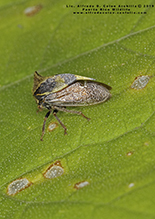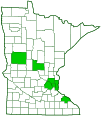Two-horned treehopper
(Stictocephala diceros)
Conservation • Description • Habitat • Ecology • Distribution • Taxonomy
Conservation Status |
|||
| IUCN Red List | not listed |
||
| NatureServe | not listed |
||
| Minnesota | not listed |
||
Description
Two-horned treehopper is a buffalo treehopper. It is a small jumping insect, a medium-sized treehopper. It occurs in the northern half of the eastern United States and in adjacent Canadian provinces. It is common in the northeast but uncommon in Minnesota, where it is at the western extent of its range. Its primary host is American elderberry but it has been found on many other plants.
Adults are small, 5⁄16″ to ⅜″ (8 to 9 mm) in length. The body is dark brown. When viewed from the side it is broadly rounded and high. When viewed from above it is triangular.
The exoskeletal plate covering the thorax (pronotum) is light brown or yellowish-brown and is densely covered with erect hairs. It is very long, extending back over the abdomen and completely concealing the triangular plate between the wing bases (scutellum). It is moderately arched, highest just before the middle. The forward corners (humeral angles) of the pronotum are extended sharply outward and upward into stout points (suprahumeral horns), suggesting the horns of a buffalo. The area in front of the horns (metopidium) is vertical and flat. There is a sharp, longitudinal ridge (carina) that extends over more than half of the pronotum, merging with a raised triangular area between the horns. There is a dark spot on each side of the pronotum below the horn, and another dark spot above near the rear.
The wings are held roof-like over the body when at rest. The first radial vein (R1) is short and is close to the start of the second radial vein (R2+3+4+5).
Size
Total length: 5⁄16″ to ⅜″ (8 to 9 mm)
Similar Species
Habitat
Ecology
Season
Early August to late September (CCESR)
Behavior
Life Cycle
Nymph Food
Mostly American elderberry but possibly many other plants
Adult Food
Mostly American elderberry but possibly many other plants
Distribution |
||
|
Sources Biodiversity occurrence data published by: Minnesota Biodiversity Atlas (accessed through the Minnesota Biodiversity Atlas Portal, bellatlas.umn.edu, 9/26/2025). |
|
| 9/26/2025 | ||
Occurrence |
||
|
||
Taxonomy
Order
Hemiptera (True bugs, Hoppers, Aphids, and Allies)
Suborder
Auchenorrhyncha (true hoppers)
Infraorder
Cicadomorpha (spittlebugs, cicadas, leafhoppers and treehoppers)
Superfamily
Membracoidea (leafhoppers and treehoppers)
Family
Membracidae (typical treehoppers)
Subfamily
Tribe
Ceresini (buffalo treehoppers and allies)
Genus
This species was formerly classified as Ceresa diceros. A revision of the tribe Ceresini moved many Ceresa species into other new or existing genera.
Subordinate Taxa
Synonyms
Ceresa diceros
Common Names
two-horned treehopper
Glossary
Pronotum
The exoskeletal plate on the upper side of the first segment of the thorax of an insect.
Scutellum
The exoskeletal plate covering the rearward (posterior) part of the middle segment of the thorax in some insects. In Coleoptera, Hemiptera, and Homoptera, the dorsal, often triangular plate behind the pronotum and between the bases of the front wings. In Diptera, the exoskeletal plate between the abdomen and the thorax.
Visitor Photos
Share your photo of this insect.
This button not working for you?
Simply email us at info@MinnesotaSeasons.com.
Attach one or more photos and, if you like, a caption.
Alfredo Colon |
 |
MinnesotaSeasons.com Photos
|

Slideshows

Visitor Videos
Share your video of this insect.
This button not working for you?
Simply email us at info@MinnesotaSeasons.com.
Attach a video, a YouTube link, or a cloud storage link.
Other Videos



